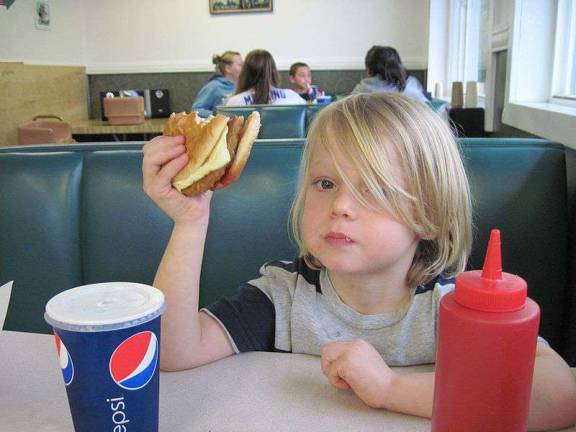Let's face it: Children are getting fatter, and as the obesity rate rises in this nation, so too does heart disease. Years ago, in my neighborhood, I used to watch the children get off the school bus, dump their books and go outside to play until it was dinner time. Now they get off the bus, run into the house and get sucked into a vortex of technology, playing video games, being on the Internet for hours and consuming fast foods that are high in sugar, salt, fats and calories. While it is unusual for children to die of a heart attack unless there is a congenital abnormality, children now are at increased risk of heart disease. Childhood obesity in this country is growing at an alarming rate. According to the American Academy of Child and Adolescent Psychiatry, between 16 and 33 percent of children and teenagers are obese. There has been a sharp rise is obesity-related problems like type 2 diabetes, which was previously only seen in adults, and there has also been a rise in heart problems. Pediatric cardiologist Dr. Douglas Luxenberg said, "Five years ago, we used to see adolescents who had problems with hypertension and hypercholesteremia, but now we are starting to see it in elementary and middle schools. "I now find that I am putting children as young as 12 and 13 on blood pressure medicine. The child now uses the medicine as a crutch and they don't make any changes in their lifestyle." As obesity is on the rise in children, more of them are now at risk for atherosclerosis, the buildup of fat- and cholesterol-filled plaques inside the arteries of the body. The American Academy of Pediatrics has revised its guidelines for cholesterol screening tests. The academy now says that even without a family history of heart disease, children should have their cholesterol levels tested between the ages of 9 and 11 and then again between the ages of 17 and 21 to reduce the risk of heart disease. The most frustrating part of patient education for Luxenberg is dealing with getting parents to make a lifestyle change. "They often want me to talk to their children about obesity or how to stop smoking, yet the parents are obese and smokers," he said. "If the parents aren't willing to make a lifestyle change, it's going to be hard for the children to make a change." In that vein, Luxenburg likes Mayor Michael Bloomberg's plan to limit the portion size of sugary drinks, saying, "It makes a lot of sense. If you make it more difficult to get to the unhealthy drinks, you will be less inclined to buy them. If you can limit easy access to extra calories, it's not a bad idea." Dr. Donna Better, a pediatric cardiologist at Winthrop University Medical Center, helps run the Change Program, where overweight children exercise and meet regularly with a nutritionist for 12 weeks. "Those kids are having success in losing weight in the first three months," she said. Luxenberg's advice to parents: "If you show them that you can cook healthy, eat healthy, incorporate exercise and diet and be healthy, they will carry that into their adulthood and be healthy adults." Better agrees, but cautions against going too far. "Kids should be allowed to be kids," she said. "If they want a soft drink or ice cream it's OK, as long as it's in moderation." Tips to Combat Childhood Obesity: Children should eat foods that are low in cholesterol and fat, limiting red meat. Eat more fish and chicken and avoid fried foods--grill, bake, or broil instead. Limit the amount of salt and sugar they eat. Increase their physical activity to at least 60 minutes a day. Limit TV and computer time. Control food portion sizes and have them eat fewer calories. Limit snacks and get healthy snack foods, not junk food. Be aware of the snacks they are eating at school as well as school lunches. Discourage smoking and, if you are a smoker, quit.

